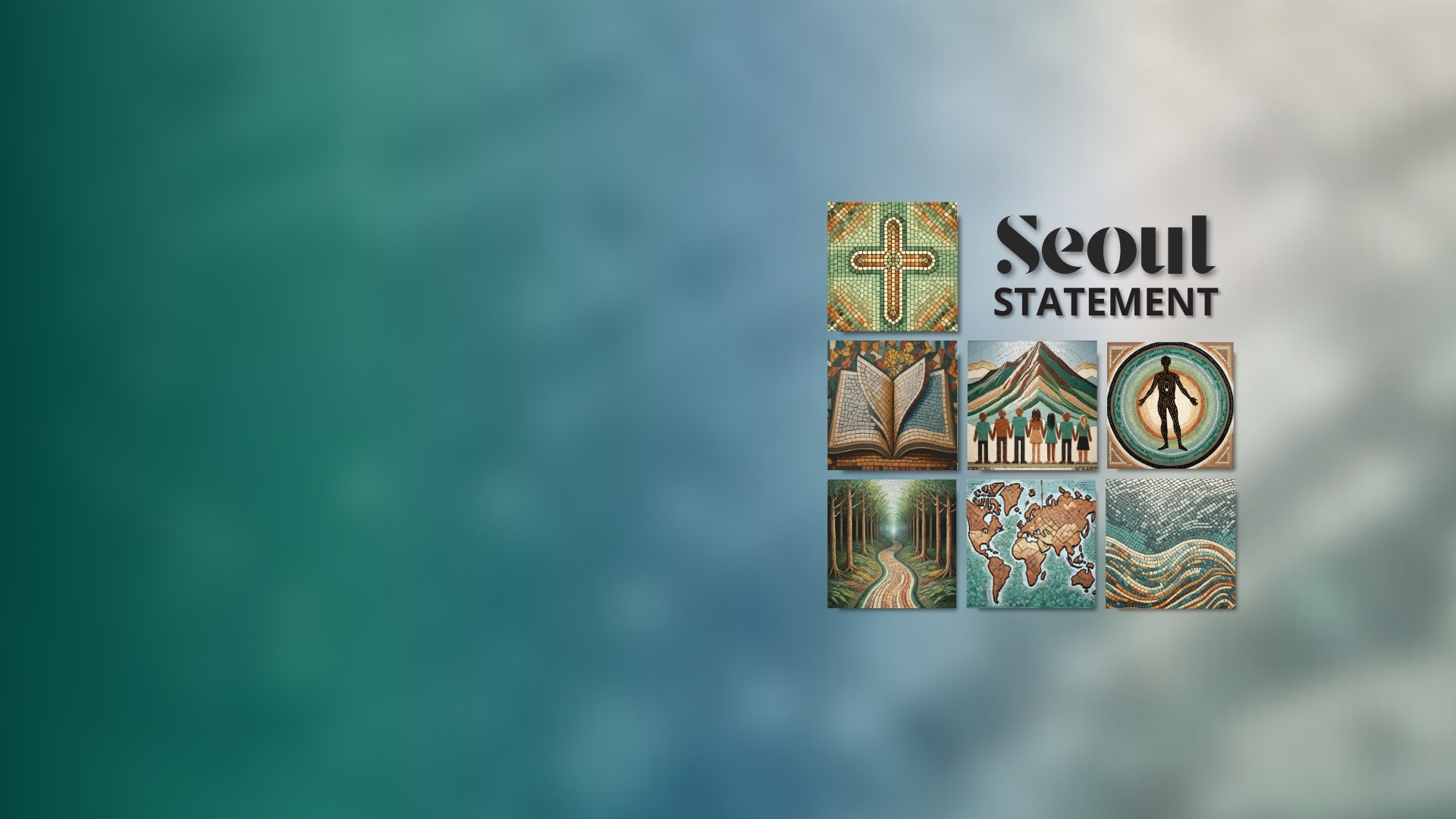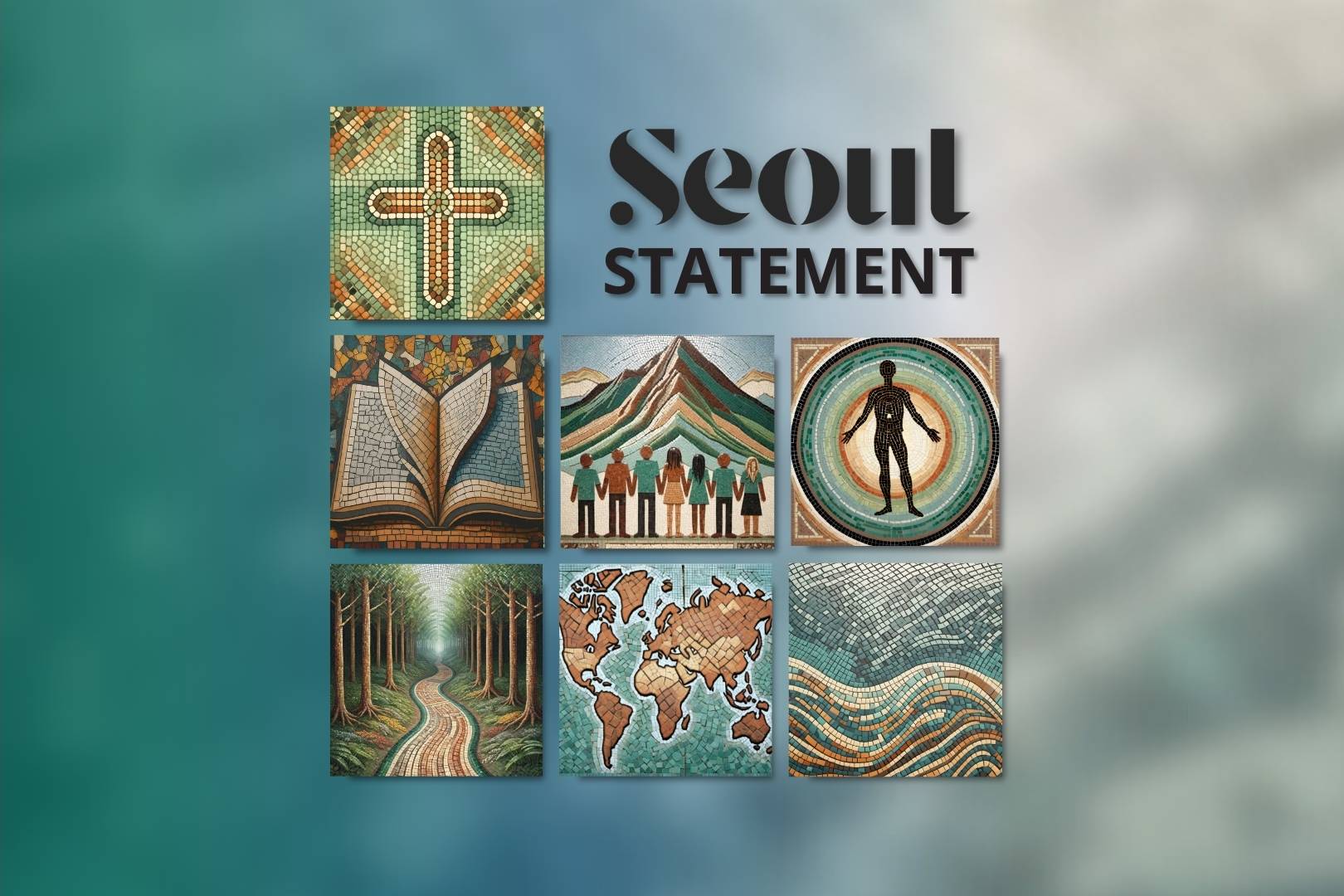The Seoul Statement, alongside The State of the Great Commission report, is being released at the beginning of the Fourth Lausanne Congress to be an informative and inspirational tool for the global church during the Congress.
The Seoul Statement does not stand alone
The Seoul Statement does not stand alone. It is significant because it builds upon an amazing foundation of the Lausanne Covenant, the Manila Manifesto, and the Cape Town Commitment. Together, they stand as contemporary reflections of biblical convictions and values. The Seoul Statement addresses contemporary gaps that the Theology Working Group (TWG) deemed necessary to address for the sake of strengthening and sharpening today’s global mission. Starting in 2019, the TWG team began to grow under the initial oversight of Michael Oh and David Bennett. These were the most important criteria for the TWG members: reputedly evangelical, recommended, global, and representative of Christian traditions. The TWG includes voices, men and women, from Latin America, Scandinavia, the Middle East, Africa, the UK, North America, Australia-New Zealand, Southeast Asia, South Asia, and East Asia. The TWG, under the outstanding leadership of Dr. Ivor Poobalan and Dr. Victor Nakah, has faithfully and compellingly given the Movement and the global church this clarion call to influence global mission for the next generation. The Lausanne board of directors wholeheartedly commends its diligent work.
THE FOURTH LAUSANNE CONGRESS
The Seoul Statement
The Fourth Lausanne Congress held in Incheon, South Korea, marks the 50th anniversary of the birth of a remarkable movement committed to global mission. The First Lausanne Congress in 1974 brought together 2,700 church leaders from over 150 countries, who affirmed their shared conviction that the whole church must take the whole gospel to the whole world.
The Fourth Lausanne Congress represents a key milestone and gathering point in a multi-year process called the Lausanne 4 journey. The journey began with several dozen listening calls with leaders from around the world, as well as focus groups and extended interviews. They sought to identify gaps, opportunities, innovations, breakthroughs, and opportunities for further research and collaborative action toward fulfilling Jesus’ Great Commission to make disciples of all the nations, teaching them to obey everything he commanded. The State of the Great Commission report, with its regional responses, focused on 40 key factors and trends emerging from that listening process that are shaping the world and the church globally as we enter the coming decade, looking even further toward 2050. The State of the Great Commission report focused on areas needing greater strategic collaborative action.
As the TWG engaged in the listening process, it focused especially on biblical and theological ‘gaps’—areas that the previous Lausanne foundational documents had not given sufficient attention. Seven themes from those gaps were selected to invite additional biblical and theological insights. The entryway to thinking about the necessity of the Seoul Statement came from the TWG’s discussion around the meaning of ‘the gospel’, its declaration and its defense. This opened up questions about crucial theological gaps evident in the global church, which work to undermine the church’s mission to proclaim and demonstrate the ‘gospel’ in the world. After compiling a list of the gaps, the TWG assigned four to be addressed by separate teams with appointed leaders. Eventually they arrived at seven gaps, with respective writers collaborating on the remaining three subjects. They sought to uphold a global perspective amidst the diversity of their various cultural and denominational contexts. Their attention to detail and scrutinizing every word and sentence was admirable. They graciously received new insights from one another, seeking to produce a biblically strategic document.
The Seoul Statement is meant to be used alongside the State of the Great Commission report so that Congress participants could be informed about both theological and strategic aspects
Because the Seoul Statement supplements, not replaces, the foundational documents, it does not attempt to be comprehensive or to repeat themes already highlighted in them. The Seoul Statement is meant to be used alongside the State of the Great Commission report so that Congress participants could be informed about both theological and strategic aspects needing attention, as they related to the Congress’ theme: ‘Let the church declare and display Christ together’. These two documents of the Lausanne 4 journey are designed to encourage biblical reflection and collaborative action for the Congress and beyond.
All Lausanne documents are part of a living and ongoing conversation between those who follow Christ as Lord, who welcome the authority of God’s Word, and who share a common vision for the gospel for every person, disciple-making churches for every people and place, Christlike leaders for every church and sector, and kingdom impact in every sphere of society. No Lausanne document is presented as the final or comprehensive statement of all of Christian theology, strategy, and mission. The Lausanne website contains a massive collection of resources on many topics, contributed not only by individuals in the Lausanne Movement, but by global teams of authors. Where there are noteworthy topics still not addressed adequately in the body of Lausanne resources, we invite leaders within the Lausanne Movement to contribute additional content, or to propose new gatherings, so that these gaps can also be addressed with biblical understanding or in strategic collaborative action.
Congress participants, and Christian leaders in general, should take the time to read the entire Seoul Statement on their own, reflectively. Since the Seoul Statement will be made available to participants during the Congress, we encourage opportunities to engage in informal discussions with friends, table groups, and fellow country-persons, on the various matters that have been addressed. Also, continue the impact of the Seoul Statement by encouraging others to read and engage it back in our home countries.
The seven themes identified in the Seoul Statement should produce a sense of clarity in a world of theological and missional confusion
It is arranged under major topics, but each individual paragraph of the whole Statement has been numbered sequentially. This makes it easy for the reader to refer to a relevant section and citation. The seven themes identified in the Seoul Statement should produce a sense of clarity in a world of theological and missional confusion—that Christian convictions are rooted in the Scripture and in two millennia of Christian tradition; that we can confidently know what is central to ‘the gospel’ and be able to distinguish what is peripheral and what is false; that we will be equally committed to the declaration of the faith (evangelism) and the defense of the faith (discipleship and pastoral care) as the twin responsibilities of being the global church.


